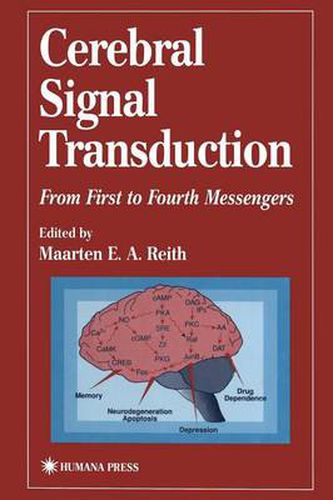Readings Newsletter
Become a Readings Member to make your shopping experience even easier.
Sign in or sign up for free!
You’re not far away from qualifying for FREE standard shipping within Australia
You’ve qualified for FREE standard shipping within Australia
The cart is loading…






This title is printed to order. This book may have been self-published. If so, we cannot guarantee the quality of the content. In the main most books will have gone through the editing process however some may not. We therefore suggest that you be aware of this before ordering this book. If in doubt check either the author or publisher’s details as we are unable to accept any returns unless they are faulty. Please contact us if you have any questions.
Since the pioneering discovery of cyclic AMP four decades ago, a multitude of signaling pathways have been uncovered in which an extracellular signal (first messenger) impacts the cell surface, thereby triggering a cascade that ultimately acts on the cell nucleus. In each cascade the first messenger gives rise to the appearance of a second messenger such as cyclic AMP, cyclic GMP, or diacylglycerol, which in turn triggers a third messenger, a fourth messenger, and so forth. Many advances in elucidating such pathways have been made, including efforts to link messenger molecules to brain processes operative in health or disease. However, the latter type of information, relating signaling pathways to brain function, is scattered across a variety of publication media, which makes it difficult to integrate the multiple roles of different signaling cascades into our understanding of brain function in health and disease. The primary aim of Cerebral Signal Transduction: From First to Fourth Messengers, therefore, is to offer a comprehensive picture of the recent advances made in the signaling field as it relates to neuronal and cere bral function. The current state of progress provides an exciting opportunity for such a comprehensive focus because molecular tools have become available to selectively remove, reduce, or enhance spe cific components in the signaling pathways, e. g. , by interfering with the genes encoding key proteins. In addition, the increased awareness of crosstalk between different signaling cascades has revealed many possibilities for changes in gene expression underlying long-term changes in brain function.
$9.00 standard shipping within Australia
FREE standard shipping within Australia for orders over $100.00
Express & International shipping calculated at checkout
Stock availability can be subject to change without notice. We recommend calling the shop or contacting our online team to check availability of low stock items. Please see our Shopping Online page for more details.
This title is printed to order. This book may have been self-published. If so, we cannot guarantee the quality of the content. In the main most books will have gone through the editing process however some may not. We therefore suggest that you be aware of this before ordering this book. If in doubt check either the author or publisher’s details as we are unable to accept any returns unless they are faulty. Please contact us if you have any questions.
Since the pioneering discovery of cyclic AMP four decades ago, a multitude of signaling pathways have been uncovered in which an extracellular signal (first messenger) impacts the cell surface, thereby triggering a cascade that ultimately acts on the cell nucleus. In each cascade the first messenger gives rise to the appearance of a second messenger such as cyclic AMP, cyclic GMP, or diacylglycerol, which in turn triggers a third messenger, a fourth messenger, and so forth. Many advances in elucidating such pathways have been made, including efforts to link messenger molecules to brain processes operative in health or disease. However, the latter type of information, relating signaling pathways to brain function, is scattered across a variety of publication media, which makes it difficult to integrate the multiple roles of different signaling cascades into our understanding of brain function in health and disease. The primary aim of Cerebral Signal Transduction: From First to Fourth Messengers, therefore, is to offer a comprehensive picture of the recent advances made in the signaling field as it relates to neuronal and cere bral function. The current state of progress provides an exciting opportunity for such a comprehensive focus because molecular tools have become available to selectively remove, reduce, or enhance spe cific components in the signaling pathways, e. g. , by interfering with the genes encoding key proteins. In addition, the increased awareness of crosstalk between different signaling cascades has revealed many possibilities for changes in gene expression underlying long-term changes in brain function.